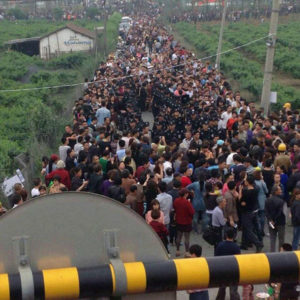
In May 2014, fearing that a proposed waste incinerator plant for Hangzhou’s Yahang district would contaminate their water supply, over 20,000 residents took part in a public protest
Photo: Shared by a protestor via takungpao (大公报)
IN THE VIEW OF the party-state’s continuing sensitivity to social unrest, collective public protests remain a perceived threat to political stability. In May 2014, fearing that a proposed waste incinerator plant for Hangzhou’s Yahang district would contaminate their water supply, over 20,000 residents took part in a public protest, blocking a major highway. The following day, the local police, the procuratorate, courts and justice bureau jointly issued an ‘Important Notice’ accusing ‘criminals’ 犯罪者 and public order ‘offenders’ 违法者 of inciting others to beat up police, damage property and disturb the public order.
The notice posted photographs of the wanted trouble-makers on their list, warned of harsh punishments and urged those on the list to surrender to police in exchange for lenient treatment. By threatening people not yet convicted of an alleged crime and identifying them as criminals, the notice calls to mind the old practice of police, prosecution and courts ‘jointly handling cases’ 联合办案 and the courts ‘intervening in a case in advance’ 提前介入, as was routine during the many hard-line anti-crime campaigns of the 1980s and 1990s.
Notes


